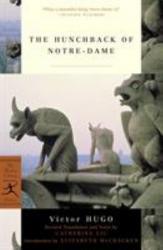
Victor Hugo is one of those classic authors who I’ve hesitated reading because his stories tend to have a lot of details that don’t necessarily add to the plot. Sure, The Hunchback of Notre Dame is no Les Misérables , but Hugo’s style made this book perhaps a little longer than it should have been. Either way, now I know a lot more about the architecture of Notre Dame Cathedral. Despite all this, the story of The Hunchback of Notre Dame is timeless in many ways, not the least of which centers around its titular character.
While modern stories are vying to be inclusive and diverse, Victor Hugo managed to write a story in the 1800s that not only included a disabled individual but racially diverse characters (at least for France) as well. The fact that both are sympathetic protagonists helps cement Quasimodo and Esmerelda in my mind. They’re both persecuted in their own ways; ostracized from a society that wants homogeneity more than diversity. Sound familiar? Perhaps this is why this book maintains a timeless quality. Even with the slight twist in the ending, the harassment endured by these individuals doesn’t dampen their kind spirits.
For those who might be more familiar with the Disney version of this story, the movie adaptation is more along the lines of a kid-friendly (i.e., sanitized) version of the basic plot. There is quite a bit more violence and “romance” involved in this story—not to mention the obvious absence of talking gargoyles—which I felt made it a little more convoluted than it had to be. Still, Hugo’s way with words was mesmerizing throughout, even if I know that they’ve been through the filter of a translator. If Les Miserables is daunting to you, perhaps try warming up with The Hunchback of Notre Dame, first. You won’t be disappointed.
A timeless classic full of diverse characters and exciting action, I give The Hunchback of Notre Dame 4.0 stars out of 5.
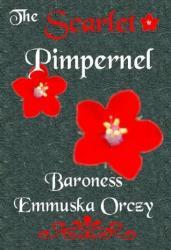
The Scarlet Pimpernel is a wonderful book that incorporates the idealism of the French Revolution to create a unique setting. The historical adventure story is filled with a great blend of suspense, thrills, and romance. The developments included in the story are well-executed and the characters are all full of life. The overarching plot is also intriguing and will captivate the reader until the end of the book. Overall, I would recommend this book to anyone, especially those who like a bit a history.
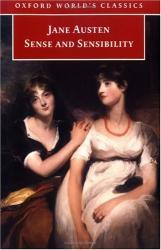
In the classic Jane Austen novel "Sense & Sensibility", three sisters -- Elinor, Marianne, and Margaret -- face a new life after their father dies and they are forced to move to a new home. The sisters' relationships are tested as they balance emotional turmoil, suitors, and new beginnings. I loved this book -- partly because Austen's writing style is straightforward and far easier to read than most classics -- and because of how much time Austen took to masterfully develop her characters. The relationship between Elinor (who is sensible and logical) and her sister Marianne (who is emotional and has a love for drama) is deep and complicated. As the story progresses, we see different sides of the sisters as they struggle to grow in their new environment. I absolutely loved this story. Honestly, there isn't a single negative thing I can say about it. I would highly recommend it to someone who doesn't like classic novels, because I think "Sense & Sensibility" could definitely change their minds.
Grade: 12
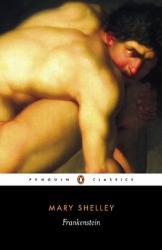
In Mary Shelley's classic novel "Frankenstein", a young ambitious scientist decides to play God and, in the process, creates a monster. As the monster struggles with self-identity and the meaning of his life, he enacts revenge on his creator by destroying everything he loves. Any time you dive into a classic novel, it can be difficult to keep your expectations from getting too high. This novel met pretty much all of mine -- the rich character development of both Frankenstein and the monster, the excellent use of suspense and foreboding to create tension, and the well-paced action. There were definitely some slow parts, but that's mostly because the writing style has changed so much between then and now. However, the multiple perspectives helped keep things moving when they began to slow down. I really enjoyed this novel but I had one fairly big complaint: the ending felt rushed. I felt that we were building up to a much more action-packed ending, but things fizzle out very quickly and the novel ends on a strangely unsatisfying note. I think that there could've been more time spent creating a strong conclusion to a really strong story. Besides that, this classic is excellent and definitely worth a read.
Grade: 12
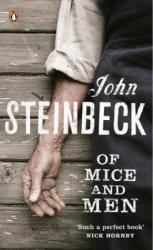
Of Mice and Men is a true classic. It is a gripping tale of friendship and tragedy that takes place during the Great Depression. Lennie and George are very well-developed characters and their story of fulfilling their American Dream is one that you won't want to put down. Of Mice and Men is a surprisingly short read, but its story is enormous. While the book does include some controversial topics, it is still a very good read that I would recommend to anyone.
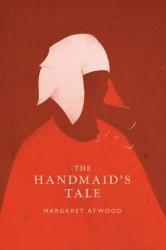
This book is old school dystopian literature. Atwood nails it. It's likely the best dystopian novel I have ever read.
Offred is a handmaid, a woman set aside for breeding purposes. Her only desire is to survive, but her memories push their way up into her mind. She had a husband and a child and they are gone. What broke my heart were the memories of her beloved child. It's so softly touched upon that it shows itself as a raw wound that she can barely handle.
Well told and powerful, I give this book 5 stars.
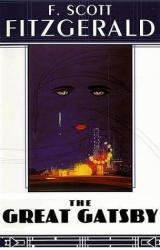
There is a reason the Great Gatsby is considered an important work of American literature. Both a highly accurate depiction of the 1920s, a deep reflection on American morals, and the reality of the American dream, and an entertaining novel in general. While some of the book struggles with some strange pacing and slightly scattered plot, it is a worth while read. This book both appears frequently in popular culture and overall is a subject that is important to know. The Great Gatsby may not be a novel for everyone, however, it is relatively short and worth reading.
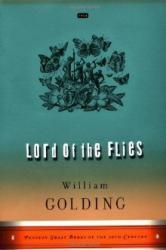
Lord of the Flies is a horrifying book. Not through horror elements, but through the themes that it presents and deals with throughout. The plot follows a group of boys attempting at self-governance, after they become stranded on an island. Their attempts at a government fail, however, as their society devolves into power struggles and an "every man for himself"attitude, which leads to the collapse of their makeshift society.
The book explores the theme of the intrinsic corruption of human nature, and what happens when a society falls prey to malice and greed. The novel forces us to take a look inward, and forces us to analyse out modern society from a new perspective. However, one downside is that the novel can be a bit dull and boring, and quite hard to follow.
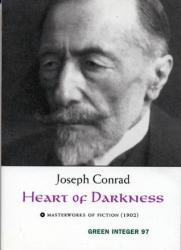
Heart of Darkness was written at a time when the horrors of the genocide in the Congo were being discovered by everyone. Joseph Conrad's magnum opus is a novel steeped in allegory and metaphor that details such genocides, while also serving to provide discourse on the nature of humanity.
The book details a character named Marlow as he travels up the River Thames in the Congo into the physical and metaphorical heart of darkness, and his experiences on his journey. The novel manages to both entrance and horrify readers, as the horrors described by Marlow are not only seen by him, but by us as an extension. The book does a wonderful job on speaking on the topic of genocide, but also helps us to learn about ourselves, about the nature of humans, and our dark hearts. This is a book that is necessary to read if one wants to consider themselves educated. However, the only downside is that it can be very hard to understand, and can be very, very monotonous and boring.
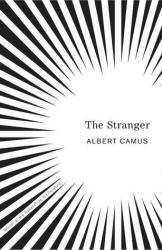
Albert Camus was a French philosopher and author who gave rise to the idea known as absurdism, the idea that humans live in a meaningless, chaotic universe. His novel, The Stranger, reflects this idea quite well. The novel is about a man named Mersault who, after his mother's death, murders an Arabic man on a beach and is sentenced to death.
Throughout the novel, Mersault is quite passive to the things around him; to his mother's death, to him shooting the Arab, and to his death sentence. This suggests the idea of absurdism: why should he protest to what is happening when he will one day die? While I like the message and the ideas the book puts forward, the writing can be a big lackluster. For example, the first half of the the novel is quite boring and moves at a snail's pace, which made it hard for me to remain interested. Thankfully, the book is quite short so it's not that big of an issue. I would recommend this novel to fans of philosophy or like novels about existentialism.
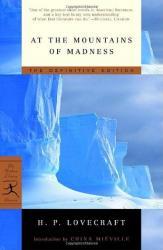
H.P. Lovecraft is commonly known as one of the titans of horror, one of the pioneers of the genre who influenced people such as Stephen King, and has even inspired several video games, such as Bloodborne. At the Mountains of Madness is considered Lovecraft's magnum opus, his best work to date. It is a novella telling the story of a small group of geologists, aviators, and explorers who travel to Antarctica in search of unique rock specimens. While there, however, they encounter several horrors, including unearthing ancient specimens known as Old Ones, a decadent, purely weird city built by the Old Ones themselves, and even giant albino penguins. This novella is truly horrifying, as the suspense Lovecraft is able to build through usage of the setting is gripping. If one is looking to begin reading Lovecraft books, this one is a great entry point, as it introduces the reader to the Old Ones, the Necronomicon, and even Cthulhu himself. I would recommend to anyone who loves horror novels, or anyone who wants to read Lovecraft.
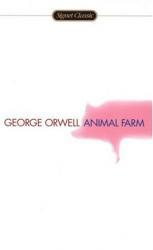
"Animal Farm" by George Orwell is about a seemingly normal farm that turns against their farmer. The animals take over the farm with the help of their leaders who are pigs. After all the humans are gone from the farm they continue under the rule of the pigs and create a system of rules to follow as a guideline for their new life. Everything goes well until one of the pigs, Napoleon, uses the dogs he trained to remove the other leader, Snowball, from the animal farm. With Snowball gone Napoleon takes complete control of the farm. He alters the rules made by Snowball, abuses his power, and makes poor decisions that negatively affect the other animals. One of their rules/guidelines was that humans were evil and not to be associated with.
Napoleon breaks that rule many times starting with making a trade of wood with another farm run by a farmer. They get scammed from the exchange with the human, but that doesn't stop Napoleon from dealing with humans. He goes to the extent of not telling the fellow animals the truth and putting all pigs above everyone else. From there things get progressively worse until Napoleon eventually befriends the humans along with the other pigs. They become so much like the humans that it gets to the point that the pigs are basically humans.
I would recommend the book. "Animal Farm" is interesting and in my opinion is in a sense satire, so I really enjoyed it. I read this book because I was planning on reading 1984 by the same author for a BTS theory and wanted to read other books by George Orwell. I kind of could relate to some of the animals because when they disagreed with Napoleon they brought up good points, but no one listened to them. The ending is very surprising and the book isn't predictable.
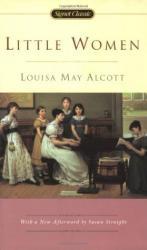
Little Women is a classic piece detailing a few years in the life of the March family. It is a beloved tale and for good reasons. This book shows the true inner workings of a family during the civil war and how love is stronger than even death. I really enjoyed Little Women because it included the historical details of the time that I find interesting, such as: having home servants even when in poverty, the intricacies of the dress, and social commentary. Little Women shows the true heart of sisterhood and friendship, along with the bonds made between parents and children. Through thick and thin, the March sisters are there for each other. Truly a delightful read for anybody.
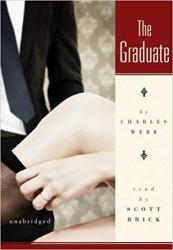
If I could condense this book down to a single phrase, it would be “What?” It’s not that I didn’t understand this book, it’s more that this single word/question was used for every third line of dialogue. Not only was this incredibly annoying to read—as every character seemed to have hearing problems that required the other speaker to repeat themselves—but it just seemed to pad out an already weak plot. I have no idea how this book became so famous that it led to a much superior film adaptation, but now I know that nobody should bother reading this book because of its inspiration for the movie.
Let’s talk about character motivations next. Nothing ever made any sense. Sure, there’s a bit of existential ennui involved with finishing something you excel in (school, in this case), but the actions of the main character only make sense up until a point. Once we hit the third act, there’s just a series of random actions that aren’t grounded in reality. This is also not to mention that the characters around him, especially the primary love interest, also make illogical decisions that aren’t founded in any sort of reality. At least this book is short enough that you’re not going to waste much time reading it.
Maybe I’m just missing the point of this book. Perhaps it’s an examination of the consequences and realizations that come from living a life that seems to have no meaning. I mean, I get the counter-play between the newly-disillusioned Benjamin and the almost permanently-disillusioned Mrs. Robinson; butwhenthe entire thing is filled with awkward and nervous dialogue that constantly repeats itself, I can’t help but think that there isn’t anything significant there. Even the ending was so abrupt and unfulfilling that I had to thank the movie version for its subtleness in revealing the characters’ realization of what they’ve done.
A truly sub-par story that was made into an above average movie, I give The Graduate 2.0 stars out of 5.

Coming from the author of "King Solomon's Mines" and creator of Allan Quartermain, you can expect a terrific turn of the century, adventure story. Written as the sequel to "She", "Ayesha: The Return of She" stands on its own, and I find it even more enjoyable than the original story (but "She" does make for a good prequel - as I read them out of sequence). Our hero Leo, sets out with his friend to seek out his long lost love. This leads them to the most remote of areas, across vast deserts, and over treacherous mountains. When they reach the empire of Kaloon, the Khania Atene swears that she is the woman Leo is searching for, but he is unsure, and wishes to consult with the mysterious Hesea, an ancient priestess of the mountain, who has sent for him. Atene will risk everything, even war with the people of the mountain, to keep Leo by her side, even though he wishes to see the Hesea. Is Atene the woman Leo is seeking? Who is the cryptic Hesea? What dangers await Leo and his friend, both in Kaloon, and on the mountain?
This story was originally published in a serialized form in 1904-1905, with gorgeous Art Nouveau illustrations. If you can find it, I highly recommend reading a reprint that includes the original illustrations. One of my favorite books of all time!
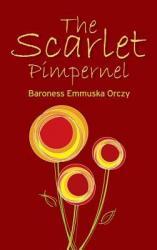
Ever since I saw the inimitable Richard E. Grant in the "The Scarlet Pimpernel" TV series, I have been enamored by these tales from Baroness Orczy. As the cliche goes though, the book is far superior to any adaptation I've seen thus far. After the French Revolution, the new government of France established the "Reign of Terror", where the citizens of France took out their anger and vengeance on any of the old aristocracy that they could find - whether they were guilty of oppressing the people, or not. Enter The Scarlet Pimpernel(!), an elusive daredevil, whose secret league of Englishmen risk their lives to save the aristocratic victims of the people of France. When the government of France charges their agent, Citizen Chauvelin, with discovering the identity of their mysterious enemy, he blackmails Lady Blakeney, a pinnacle of London society, into aiding him in his treacherous task. Who will she turn to, to help save her only brother - her insipidly foppish husband, Sir Percy Blakeney? He may be rich, and the leader of fashion in London's high society, but he's certainly not a "man of action" for something so perilous and vital. Lady Blakeney must face her inner struggles to try to find the hero who she admires so much, only to betray him. Meanwhile, the infamous guillotine awaits her next victims...
Published in 1905, "The Scarlet Pimpernel" established many of the hero tropes that are familiar today, such as having a secret identity, and using disguises and intelligence to outwit one's enemies. This is truly one of my favorite series. If you like this book, there are follow-up chapters, such as "I Will Repay", and "The Elusive Pimpernel", that are worth your attention as well!
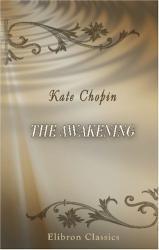
This book is about Mrs. Pontieller, a woman in turn of the 20th century New Orleans. She falls in love and finds herself awakened to a natural state, one that doesn't conform to her life as a wife, mother, and socialite. I liked when Mademoiselle Reitz encouraged her to be a strong bird that defies the laws of gravity and soars above the ground below, not to be weak and come crashing to earth. At the end, Mrs. Pontieller sees a wounded bird fall from the sky and cements her fate likewise.
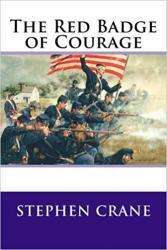
War is an ugly thing full of death and destruction. While most books written today bemoan this fact and complain that wars should never start in the first place, what do the individual soldiers handle a war that they didn’t even start? Set in the Civil War, The Red Badge of Courage is perhaps the best representation of the growth of a soldier from a deserter to a courageous fighter. Our intrinsic fear of death is what motivates so many of us to do the things we do to survive. Overcoming that fear and charging headlong into battle does take a measure of courage usually not present in most people.
Stephen Crane does a fantastic job weaving the story of a young man who has to learn what it truly means to earn the titular “red badge of courage.” His prose is almost poetic as he describes the landscapes, battles, and people who were forced to endure this historic war between brothers. There’s realism to the narrative that immerses the reader into the era and the battles that helped to define the war as a whole. In the end, though, this book could almost be set during any period and any war; the themes present within it are that timeless.
While it took me this long to finally sit down and go through this book, I’m glad I finally did. I had started it many years ago but lost interest for some reason. This time around, I was able to appreciate the story based solely on the strength of Crane’s writing. I know this book is usually assigned to elementary school students at some point, but if it has escaped your “read” list as it did for me, then I would urge you to pick it up and give it a read. It won’t take long, and it’s certainly worth the time spent reading it.
A timeless classic that deals with the human side of war, I give The Red Badge of Courage 4.0 stars out of 5.
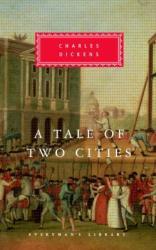
“It was the best of times, it was the worst of times…” The opening lines say it all. I do enjoy Dickens, but this is by far, my favorite novel of his. This book follows the effects and far-reaching ramifications of the arrogant cruelty of the French aristocracy before their Revolution. A man is saved from an unfair imprisonment, but must regain himself through his devoted daughter and friends. They build a new life in England, where we get to know an array of complex characters – each with their own foibles and narratives. Meanwhile the fervor of the people of France veers towards the inevitable overthrow of the tyrannical aristocracy, and as often happens, the oppressed become the new oppressors. Destiny drives our main characters into the French turmoil where they find chaos, danger, and ultimately redemption.
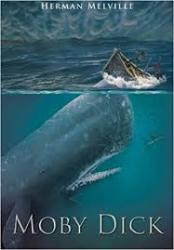
Moby Dick is a classic piece of literature, an iconic masterpiece. The story, once it pick up, is extremely engaging and interesting. The characters, such as Ishmael and Captain and Ahab, all exude personality and uniqueness. Plus, it has one of the greatest antagonists in all of literature: Moby Dick himself. I thoroughly enjoyed this novel from beginning to end. There are some downsides, such as the language of the seamen being somewhat hard to grasp, and the several chapters describing whaling or the anatomy of whales being completely pointless. However, these do not detract too much from the overall experience, and the novel is still an exceptional one. I would recommend this to anyone who is looking for a good novel to read, or anyone who has a passion for the ocean.



 Ruth Holley Library will be temporarily closed for approximately one week starting Mon., Dec. 2 to complete roof repairs.
Ruth Holley Library will be temporarily closed for approximately one week starting Mon., Dec. 2 to complete roof repairs.